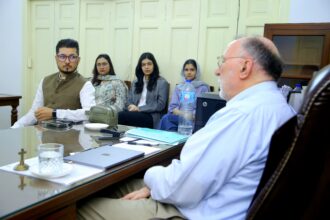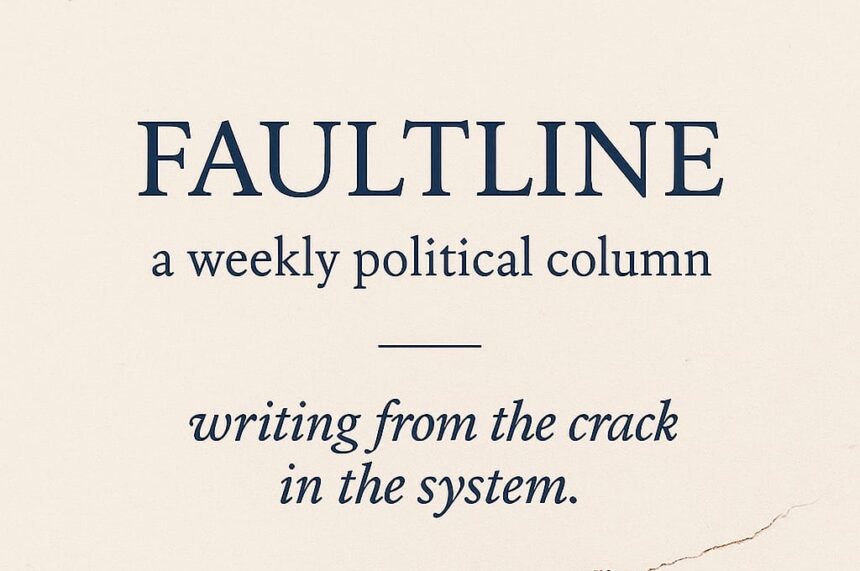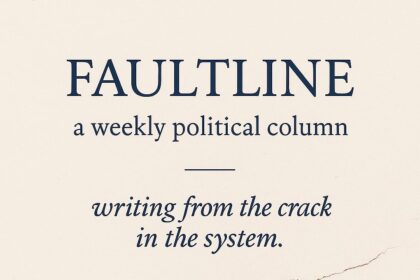It is your sixth consecutive video compilation of the PAF officer who has recently been making headlines in Pakistan, for reasons beyond defence strategy. You think it is harmless, a naive Lolita-esque fantasy of an otherwise unattainable man in boots. Now read that sentence again, circle back to the neon signs, and ask yourself, “Who benefits from my parasocial devotion?”
This isn’t a matter of morality, not yet at least. Moral amnesia has long engulfed this nation, whose citizens possess the unusual talent of both suffering beautifully at the hands of and worshipping the same teeth that bite them. In circumstances like these, remembrance becomes resistance. When a child in morning assembly sings the national anthem, they are overcome with no patriotism beyond what is prescribed within the bounds of sensationalist paranoia. None of these acts qualify as state violence, but they are convenient artefacts of propaganda, persistent in the residue of an otherwise orphaned nation. Where ‘Pakistan Zindabad’ serves as their strength, it is the same chant weaponised when Waziristan and Balochistan are raided in the name of national security.
But you wouldn’t read that in the news. Just like you wouldn’t unlearn the carefully crafted political history of this country unless you look beyond its jingoistic national curriculum or stop glorifying liberal activists who are silent in the face of state-sponsored persecution but are the first to condemn PR sovereignty crises shrouded in foreign policy. Propaganda is often imagined as loud: blaring sirens, Orwellian parades, the undoing of the century. But it is more effective when quiet and more harmful when soft-edged, slowly integrating a social framework that allows lies to be seen as the truth. Better yet, to feel like it.
We imagine propaganda to be a strictly governmental construct, but what of the invisible biases hegemonising our lives, waged by and against people? As Arendt explains, you do not need to be a ‘convinced’ Nazi or Communist, but merely someone who finds the distinction between fact and fiction irrelevant. In Pakistan, propaganda is the texture of life. It is written in textbooks that exalt conquest while obscuring genocide, rape, and intellectual depravity. It breathes into the family dinners where women’s modesty becomes national honour, penetrated only through the same patriarchal structure aimed at ‘protecting’ them. It echoes in the word ghaddar, a label casually thrown at anyone who loves their country but not its myths. To love is to question, because isn’t obedience without reason merely manufactured consent?
Language is where propaganda thrives, where euphemisms like ‘collateral damage’ and ‘surgical strikes’ transform wars into bite-sized stories, no longer describing reality but distorting it. But what is left of stories when the institutionalisation of language dehumanises lived experiences, thereby hijacking the very voice whose identity is erased in the act of ‘preserving’ it? We are so used to seeing tragedy being commodified that when it plays out in real life, we turn to the same bystander effect we chastise in others. We are only allowed to express grief when it flatters power. While Muslim suffering worldwide is abysmal, we turn a blind eye to the same crime committed on our own soil, because in the end, totalitarian interests take precedence over human rights, give or take a continent.
A possible silver lining: not all propaganda is deliberate. Sometimes it is just the woman in a jilbab covering herself because that is what ‘chaste’ women do, or the man who mocks regional accents because in his head, he is still colonised, so every act of subjugating others is a liberation of his own generational trauma. These actions, though mundane in their unique ways, are drowned in a system of inherited distortions. They may not be inherently evil, but they are acts of forgetting. And forgetting is where violence begins.
In this light, even the smallest objects become weapons of cultural engineering. Tea in Pakistan is not a beverage but a symbol of patriotic zeal, a constant montage of myth-making machinery utilised to discourage dissent through constitutional obligation engulfed in heroism.
Even here, I acknowledge the irony. My own language is not immune – it is intellectualised, morphed to manipulate the reader into academic submission. I lace this essay with theory and reference not because my ideas need ornament, but because my clarity might as well be a performance of legitimacy. In this way, my own critique risks becoming the disease I talk of: aestheticised dissent, packaged resistance. I am not separate from what I describe but shaped by it.
To resist propaganda, therefore, is not treason, or blasphemy, or whatever hedonistic connotation the act might accompany. It is to become awake. It is to ask yourself: Who benefits from this belief? Why must I hate to be loved? Orwell reminds us that freedom begins with the freedom to state that two plus two equals four. Wherever you are in the world, narrative is power, and freedom begins with recognising that you are not isolated from it.
The question is not whether you are immune to propaganda. But whether you have stopped to ask yourself if you are?






I am speechless. This is the most intellectually stimulating writing I’ve ever read.